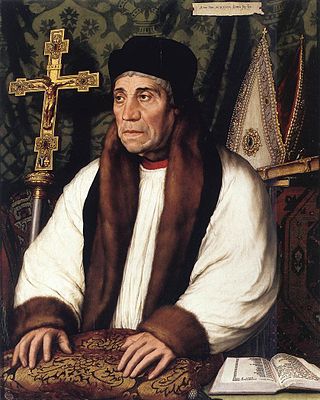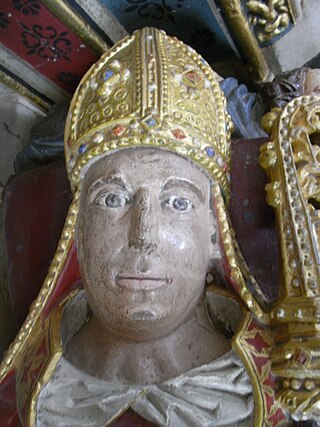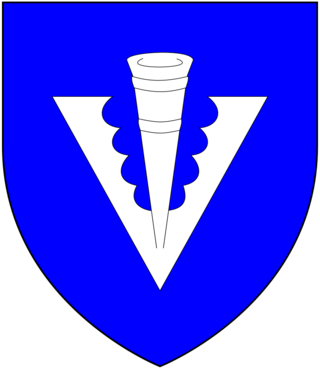Related Research Articles

William Warham was the Archbishop of Canterbury from 1503 to his death in 1532.

Richard Foxe was an English churchman, the founder of Corpus Christi College, Oxford. He was successively Bishop of Exeter, Bath and Wells, Durham, and Winchester, and became also Lord Privy Seal.
John Bell was a Bishop of Worcester (1539–1543), who served during the reign of Henry VIII of England.

Hugh Oldham was an English cleric who was Bishop of Exeter (1505–19) and a notable patron of education as a founder and patron of Manchester Grammar School and Corpus Christi College, Oxford.
James Brooks was an English Catholic clergyman and Bishop of Gloucester.
Thomas Young was a Bishop of St David's and Archbishop of York (1561–1568).
John Longland was an English cleric. He was Dean of Salisbury from 1514 to 1521 and Bishop of Lincoln from 1521 to his death in 1547.
Hugh Weston was an English churchman and academic, Dean of Westminster and Dean of Windsor, and Rector of Lincoln College, Oxford.
William Lancaster D.D. (1650–1717) was an English churchman and academic, Provost of The Queen's College, Oxford.

William Bradbridge (1501–1578) was an English bishop of Exeter.
William Warham was a late-medieval English ecclesiastical administrator who was Archdeacon of Canterbury from c. 1505 to 1532 during the archiepiscopate of his uncle William Warham, Archbishop of Canterbury.
Thomas Gerard (1500?–1540) was an English Protestant reformer. In 1540, he was burnt to death for heresy, along with William Jerome and Robert Barnes.
Thomas Bedyll (died 1537) was a divine and royal servant. He was royal chaplain and clerk of the Privy Council of Henry VIII, assisting him with the separation from Rome.
Francis Babington D.D. was an English divine and an academic administrator at the University of Oxford. He was elected Master (head) of Balliol College, Oxford on 2 September 1559, a post he held until he resigned the following year on 27 October 1560. Babington was Vice-Chancellor of Oxford University from 1560 to 1562. He was also Rector of Lincoln College, Oxford, from 1560 until he resigned in 1563.
Ralph Hamsterley was a Master of University College, Oxford, England.
George Ryves was an English academic administrator at the University of Oxford.

Robert Hovenden D.D. (1544–1614) was an English academic administrator at the University of Oxford.
John Fuller was the master of Jesus College, Cambridge. As bishop's chancellor in Ely, Cambridgeshire, he was charged with suppressing Christian heresy, condemning several heretics to be burnt at the stake.
Alban Langdale or Langdaile was an English Roman Catholic churchman and author.
References
- ↑ Salter, H. E.; Lobal, Mary D., eds. (1954). "Lincoln College". A History of the County of Oxford: Volume 3: The University of Oxford. Victoria County History. pp. 163–173. Retrieved 12 September 2011.
- ↑ "Previous Vice-Chancellors". University of Oxford, UK. Archived from the original on 19 April 2014. Retrieved 12 September 2011.
- ↑ "Actes and Monuments Of the Churche". John Foxe's Book of Martyrs. HRI Online, UK. 2004. p. 610. Archived from the original on 14 June 2011. Retrieved 12 September 2011.
